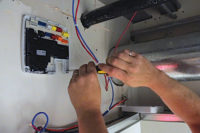As more and more homeowners opt to forego traditional phone service in favor of cellular service or VoIP, alarm systems with cellular communication are being installed like never before. Some dealers are encouraging all customers to use cellular, even when they have a traditional phone line, because that option minimizes potential future headaches if the customer should cancel voice service at some point in the future.
“More and more dealers are starting to lead with cellular or to build cellular into the cost of their product offering,” comments Shawn Welsh, vice president of marketing and development for Telguard, a division of Chicago-based Telular that manufactures cellular alarm transmission equipment.
This shift has driven security dealers to rethink many aspects of their business — including monitoring and installation as well as sales and marketing. In this article we look at what it takes to successfully market and sell cellular alarm systems.
Pricing Considerations
A critical marketing decision that security dealers must make about cellular systems is how to price them. Although there are powerful reasons to sell cellular today, cellular connectivity may add to the cost of an installed system as well as to monthly recurring costs.
Some manufacturers charge more for panels with cellular connectivity — especially if the equipment also supports traditional phone line connectivity. If the dealer opts to connect the panel to a traditional phone line and to the cellular network, installation costs also will be higher than for a phone line-only system.
Some dealers like to include a phone line or Internet connection as a backup to cellular or vice versa. Others are content with cellular only — especially if the system uses one type of cellular communications as a backup to another. Honeywell, for example, makes a cellular communicator that primarily uses GPRS data service but falls back on short message service (SMS) if GPRS is not available. Visonic Ltd. makes a system that primarily relies on GPRS but uses a cellular voice connection as a backup.
If a dealer relies on cellular for communications, the amount of labor required to install a system can be minimized. “The only thing you need is a good cellular signal,” notes Jeff Britton, general manager of SecureCom Wireless for Springfield, Mo.-based manufacturer Digital Monitoring Products (DMP). “You don’t have to worry about the demarc and you don’t have to string up a phone line. If you use premises wireless, you can be in and out in less than an hour. The installation savings should offset the equipment cost.”
When it comes to monthly monitoring costs, it’s a different story. These costs will always be higher when cellular is used because in addition to the regular monthly monitoring costs, there are also airtime charges for the cellular service. Most wireless service providers have developed special plans for the alarm industry that are GPRS- or SMS-only or GPRS with SMS or cellular voice as a backup and which take into account the relatively small amounts of data that alarm systems send per month. Such plans typically cost a few dollars a month, with billing in some cases handled through the equipment manufacturer.
Depending on which manufacturer’s equipment is used, there also may be ongoing monthly charges for alarm signal translation services provided by the manufacturer. In that scenario, the alarm panel communicates with a network operations center (NOC) operated by the manufacturer, which converts the alarm signals into a form that virtually any central station receiver can recognize, and then sends them to the central station.
Dealers can minimize their monthly costs by using alarm equipment from a manufacturer that does not require communications to go through its NOC. But to do that, dealers — or in the case of a third-party central station, the central station owner — may entail an upfront charge for a receiver or server that can correctly interpret cellular communications from that manufacturer’s equipment.
Some dealers charge more for installation for a cellular system not only because their equipment and/or installation costs may be higher but also because cellular capability adds value to the system. “You can get a premium on cellular because it’s a newer technology and has a big benefit,” observes Britton. “No one can cut the phone line.”
Others argue that dealers should consider taking a bit lower margin on cellular installations because of the operational benefits — such as future-proofing — that it provides. “Dealers that understand that cellular is going to be a key piece of helping minimize operational expenses will often not mark it up so much and build it into their standard rates,” Welsh notes.
Visonic President Mark Ingram concurs. ”You need to be extremely careful about pricing it appropriately and not trying to make a ton of money,” Ingram advises.
Almost everyone agrees, though, that the monthly recurring cost for a cellular system needs to be priced higher than for a traditional phone line-based system. Several cite pricing of about $10 more per month than for a traditional system.
Interactive Capabilities
Another way that dealers can enhance the appeal of a cellular alarm system and generate additional revenues is by enabling the customer to remotely control and check system status using a cell phone or Internet connection. This capability is not available on traditional phone line-connected panels because a traditional phone line cannot recognize data communications.
Several manufacturers of cellular alarm systems offer an application for smart phones or cellular data devices — such as the iPhone, Blackberry, or Android devices — that enables home or business owners to check system status or to remotely arm or disarm the system. Typically these applications are available at no charge, but because the use of these devices adds to the airtime used, dealers often charge a bit more for this capability on a monthly basis.
“People view it as a portable remote control,” notes Gordon Hope, general manager of Honeywell’s AlarmNet business unit. ”You now have two-way communications with the panel.”
Telular has a website that dealers can use their own smart phones to connect with as a means of simulating remote system control. “People can see what the app looks like on different platforms,” Welsh explains. “A button glows depending on the current state of the panel and you can touch it to change the status. It’s very effective as a tool to close the sale. By using an app, I feel like this is part of what I pay for and part of the experience and the overall solution.”
Some dealers are having success at selling interactive remote control by borrowing an idea from the cable industry, Britton describes. They offer interactive capability at no extra charge for the first six months. When the trial period ends, many customers find sufficient value in the remote control capability that they keep the service even when it costs a bit more.
Even if a customer isn’t ready to purchase interactive capability up front, its mere existence can sometimes help persuade the customer to purchase service. Hope advises dealers to sell cellular connectivity on the basis of what customers could miss in the future if they opt only for traditional phone line connectivity. “In the future you may want to save money by switching to a competitive phone company, or your existing phone service may be more expensive,” observes Hope. “But if you change you won’t be able to use your security system or have remote control.”
Video Verification
Another unique capability that can help sell cellular connectivity is video verification. At least two manufacturers — Visonic and White Bear Lake, Minn.-based RSI Video Technologies — offer wireless video cameras that automatically send a clip to the central station if motion is detected. The clip helps central station operators determine if the alarm was caused by a human intruder or if, instead, it is a false alarm.
“The true measure of security is how fast the police get there — when they know it’s a real alarm, they go faster,” comments Keith Jentoft, president of RSI, which markets a single device it calls a “motion viewer” that contains both a video camera and a PIR under the Videofied brand.
A traditional phone line is impractical for sending video clips because it lacks digital communications. But unlike higher-speed landline broadband service such as DSL or cable modem, which can support streaming video, GPRS only provides enough bandwidth to send a video clip.
Both Ingram and Jentoft position this as a positive, however. Some customers, they say, are wary of streaming video options that give them the ability to look in on their home or business because they are concerned that unauthorized users also could look in.
“What RSI offers is really a video intrusion alarm, not a surveillance system,” Jentoft explains. “Customers are not worried about the alarm company looking in.”
In addition to enhancing the appeal of a cellular-based system, video verification also can help maximize revenues from the installation — both up front and on an ongoing basis.
Wireless Mesh Is Another Alternative
Cellular isn’t the only wireless alternative to a traditional digital dialer. Another option is to install communications equipment based on wireless mesh technology. With this approach, every alarm system that a dealer installs in a metro area includes a transceiver that can act as a repeater on the network. Each transceiver is programmed to find a path to the central station by sending signals to another transceiver within its line of sight. The process is repeated until the signal reaches the central station — a process that typically happens within a few seconds. The more customers a dealer has, the more paths that are available to the central station and the more reliable the network is.
Keyth Security Systems, an alarm dealer based in Highland Park, Ill., provides AES Intellinet wireless mesh network for the majority of its installations in the Chicago metro area, notes Keyth Security Vice President Sue Weinstein. Any system designer should lead the customer’s sales presentation with the objective of ensuring system communications, Weinstein advises. Once the customer understands the significance of signal continuity, the wireless solution becomes the foundation for the system since it is not affected by damaged or other lack of phone communication. Additionally, the wireless solution provides faster communication to the central station response center, Weinstein advises. Because Keyth maintains its own wireless mesh network the company does not incur pass-through charges that are normally found with cellular-based systems, Weinstein says.
“We call it unlimited free airtime for life,” comments Jim Lynch, product manager for AES Intellinet.
Atlas Security No Longer Installs Digital Dialers
One security dealer that no longer installs digital dealers is Springfield, Mo.-based Atlas Security. The company made that decision, in part, because if customers with digital dialers later switch to VoIP and discover that the service is incompatible with the alarm system, they may opt to cancel service rather than pay for cellular communications at that time. Wishing to avoid that scenario, Atlas Security prices its cellular-based systems competitively. The company accepts a bit narrower margin on the installation with the goal of minimizing long-term churn, notes Jon Adams, operations center manager for Atlas Security.
In selling the service, Adams says, “We start with the basics — cellular eliminates the risk of somebody cutting the phone line.” Salespeople also explain that cellular communications gets alarm signals to the central station more quickly than a digital dialer can.
Finally, in lightning-prone Missouri, cellular is viewed positively by customers when a salesperson explains that lightning strikes can go through a phone line, Adams observes.











